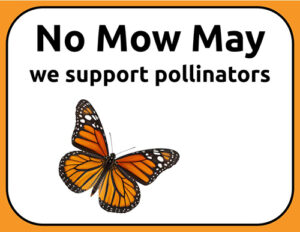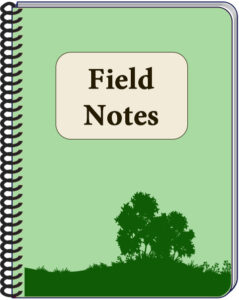By Rachel Neurath
Field Notes is an occasional feature highlighting climate and environment work in town and spotlighting Lincoln residents and staff. Rachel Neurath is a soil microbial ecologist, co-leader of Lincoln Common Ground, and a member of Lincoln’s Climate Action Plan Working Group.
This May, Lincoln is joining the growing global movement to keep mowers in the shed until June. By delaying mowing, you give flowers a chance to bloom among the grass. Flowers provide nectar and habitat for pollinators like butterflies, bees, and hummingbirds. No Mow May is a chance to discover beautiful surprises, support pollinators, create a wildlife haven, increase ecosystem resilience, and store carbon in soil. The Lincoln Land Conservation Trust (LLCT) and Lincoln Common Ground encourage you to give it a try — even leaving a patch of lawn unmown can make a big difference.
On Tuesday, April 11 at 7 p.m., I will give a Zoom presentation on No Mow May. I will talk about its benefits, share photos of my unmown lawn last May, give some tips, and open the conversation up to answer your questions. You can learn more and register here.
 Robin Wilkerson, ecological landscape designer and gardener, is leading the Lincoln Common Ground No Mow May movement. Wilkerson and other Lincoln Common Ground members will table at the transfer station on Saturday, April 8 and Saturday, April 22 from 8 a.m–noon where you can learn more about No Mow May.
Robin Wilkerson, ecological landscape designer and gardener, is leading the Lincoln Common Ground No Mow May movement. Wilkerson and other Lincoln Common Ground members will table at the transfer station on Saturday, April 8 and Saturday, April 22 from 8 a.m–noon where you can learn more about No Mow May.
“Since learning as a child about the demise of passenger pigeons, I gained an understanding of the irreversible damage that humans can inflict on the environment. Then Rachel Carson wrote her unfortunately prescient book, Silent Spring, about the catastrophic effects of our war on insects. Those two events set me on a life course of being a committed organic gardener and attempting to live compassionately on the land,” Wilkerson says,.
“I am utterly buoyed by others who share this sensibility. Lincoln Common Ground is a group of passionate people who care deeply about the survival of species and at the same time we are trying to find ways to address the climate emergency. It’s a big task, but it’s a journey with a group that gives me hope.”
Bryn Gingrich, outreach director of LLCT, grew up in Lincoln. Last May, Gingrich’s unmown lawn transformed into a sea of violets. “No Mow May is a really exciting initiative because it focuses on an easy way for folks to improve biodiversity in their own yards,” she says. “It’s a really hopeful and positive way to engage with busy families because it’s actually less work for people and they can enjoy seeing more color and more life in their lawns. I think it’s important to recognize that this is a big culture shift we are promoting. Perfectly manicured and leaf-blown lawns are seen as a sign of care for one’s property. That’s why signage is such an important part of initiatives like this one. Signs like LLCT’s Pollinator Pathway signs cue passerby that the “messiness” is intentional.
“I also want to acknowledge that change can be slow and incremental, and for me just seeing small patches of unmown lawn or new pocket pollinator meadows popping up is heartening.
“One of the ways that LLCT has been engaging with our community recently is providing content on the connection between land stewardship and biodiversity, ecosystems, and carbon sequestration. This applies both on conservation land, stewarded by LLCT, and in Lincolnites’ yards and gardens. As part of LLCT’s Pollinator Action Plan, we’ve put a much greater emphasis on new plantings on conservation land that increase biodiversity and functional ecosystems.”
My family loved No Mow May last year and plans to participate every year now. We were amazed how many flowers popped up in our yard. I worried we might find more ticks on our daughter, but we did not. New research actually shows that mowing less frequently can decrease ticks. You can learn more about No Mow May here. So this May, consider letting it grow.
“My Turn” is a forum for readers to offer their letters to the editor or views on any subject of interest to other Lincolnites. Submissions must be signed with the writer’s name and street address and sent via email to lincolnsquirrelnews@gmail.com. Items will be edited for punctuation, spelling, style, etc., and will be published at the discretion of the editor. Submissions containing personal attacks, errors of fact, or other inappropriate material will not be published.

Thank you, Rachel and Robin. I support NoMowMay and am putting a ‘messy’ pollinator patch in the midst of my yard.
Last year my husband, an avid mower, got sick with COVID and our lawn was not mowed for most of May, (He also may have heard my hints about No Mow May…) A mysterious patch of purple Self Heal, or Prunella, appeared. And I noticed many more birds in our lawn, hopping after the tiny insects hiding in the longer grass. It was exciting to see how this small action really made our small yard a more functional ecosystem. Thank you to Lincoln Common Ground and LLCT for supporting people to try this.
It will be inspiring to drive around town and see patches of longer lawns with little colorful flowers. I’m on board! Thanks Rachel, Robin, and Bryn for the great article.
Gwyn Loud